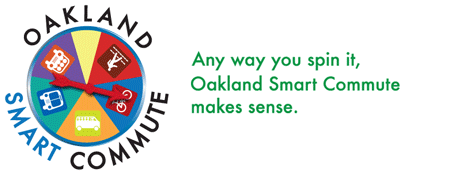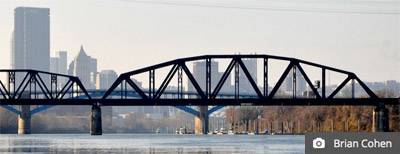New App for Bicyclists: Dashcam for your Bike & Map of Hazards for Bicyclists
A Pittsburgh-based startup, Dashcam for your Bike, created an app to report hazards for bicyclists in the city. The reported hazards are listed on a public map and reported to 311 to improve roadway safety for cyclists.To participate, cyclists can download the app for Android or iPhone and begin recording their ride. When encountering a hazard in Pittsburgh, cyclists can tap the screen to add a marker, and then when finishing their rides, return to the marker, hit “Share,” and then select “Report to 311.”
Visit the developer's website to learn more, download the app, and view the roadway hazard map.
Results from the Make My Trip Count survey are released!
Make My Trip Count is a regional transportation survey of 18,104 commuters in the Greater Pittsburgh Area designed to understand how people in the Pittsburgh region get to work. The survey measured data collected between September 10, 2018 and November 9, 2018 representing the opinions and behaviors of Pittsburgh commuters. It studied the modes and obstacles faced by commuters traveling using personal vehicle, bike and bike shares, public transit, ridesharing services, electric vehicles, and more. The results of the 2018 survey are available on their website.
The key findings included:
Single Occupancy Vehicle (SOV) use is the preferred mode for Pittsburgh commuters, yet there is a strong subset of drivers who employ alternative modes when traveling to work or school. 66% used a SOV for their commute at least part of the time, but only 23% only drive alone. And 59% used public transit some of the time, with 40% using public transit as their primary method of transportation. In a related statistic, 19% report working from home at least sometimes, and 19% reported using rideshare services or taxis, but working from home and rideshares were not generally used as a primary mode.
While bus use is more frequent than light rail use in the region, overall rider satisfaction is greater among those who use light rail. Both transit modes receive good marks from commuters for their cost and ease of use, but receive lower ratings on comfort and availably of amenities. Riders indicate relative satisfaction with the service area and frequency of service for both modes.
There is a strong subset of bicycle riders who are dedicated to their commute mode. About one-third of riders say they bike for their commute during the winter months. Bicycle commuters tend to live between two and five miles from their worksite. Bicycle riding is not perceived as an overtly safe way to commute.
The Make My Trip Count (MMTC) 2018 survey has officially launched!
The Make My Trip Count regional commuter survey launched, as part of Pittsburgh’s effort to capture residents’ changing transportation choices. The survey on MakeMyTripcount.org takes 5 to 10 minutes, and the results will inform critical transportation and infrastructure decisions throughout Western Pennsylvania.
“Planning is at the core of what we do to ensure that we are meeting the needs of our residents – both current ones and future ones. Through the Make My Trip Count survey, we learn about the wants and desires of commuters when it comes to transportation,” said County Executive Rich Fitzgerald. “Our region has always worked proactively to improve our system and operations by developing a plan. The results of the survey will help lay the foundation for future steps.”
Created by Green Building Alliance in partnership with the region’s major transportation partners Make My Trip Count (MMTC) measures traditional transit modes like personal vehicles, light rail, and buses, in addition to ridesharing (such as Uber and Lyft), electric vehicles, and bike share users. In the survey’s 2015 release, more than 20,000 people shared when, from where, how often, and by what modes of transportation they travelled to work.
“The Make My Trip Count survey has deepened our understanding of how people move throughout the city,” said City of Pittsburgh Mayor William Peduto. “With clear actionable data, we’ve been able to address Pittsburghers’ real transportation needs as we continue to support the city’s economic transformation.”
Regional transportation projects like the Bus Rapid Transit expansion and Southwestern Pennsylvania Commission’s long range strategic plan have already used MMTC responses to guide their designs, and respondents have the opportunity to directly influence policies affecting their daily lives. “The survey asks every resident to share their commuter experience,” explains Executive Director of Green Building Alliance Jenna Cramer. “We can only create a healthier and more vibrant city if we understand how all Pittsburghers access economic opportunity.”
Respondents who complete the survey will be entered into a drawing to win one of twenty $50 visa gift cards. Make My Trip Count runs from September 10th until October 26th on MakeMyTripCount.org.
State Budget Proposal Would Reduce Public Transportation Funding, Force Service Cuts
A state budget proposal released last week would reduce support for public transportation and force Port Authority of Allegheny County to cut substantial levels of transit service, including the elimination of nearly half of the agency’s bus routes along with evening and weekend service.
“This proposal is harmful to our residents and would be devastating to our strong and growing economy,” said County Executive Rich Fitzgerald. “More than 100,000 people rely on public transit each day to get where they need to go. These cuts don't only impact riders, but businesses and other residents because of the ripple effect throughout the county on our service.”
The proposal offered by members of the House of Representatives would allow the state to take $357 million from a state trust fund that is intended to support public transportation programs and instead use it to help balance the state budget. The state’s trust fund is a mixture of dedicated bond funds and various fees, and subsequently, PennDOT has said the $357 withdrawal would have to be replenished by using dollars intended to support transit operations. The immediate impact on Port Authority's funding would be a loss of FY 2018 operating support totaling $80 million, or 19 percent of its entire projected revenue for 2018.
“A sudden decrease in support of this magnitude would impact nearly all of our riders who depend on transit to get to work, school, medical appointments and conduct their lives,” said Port Authority’s Board Chairperson, Jeffrey Letwin. “Act 89 was a thoughtful solution to transportation funding and is working effectively. The Port Authority Board urges the legislature not to discard the progress we have made together.”
Last Friday, David Donahoe, Port Authority's interim CEO, sent a letter to the Allegheny County Legislative Delegation outlining how the cuts would impact the agency and its 62 million annual riders, which would include the elimination of nearly half of all bus routes, weekend and evening service, and substantial fare increases throughout the system. More than 100,000 people use Port Authority bus, light rail, incline and paratransit services, taking about 200,000 daily trips.
The proposal, Donahoe said, "would not only devastate the Port Authority system but undermine the stable, predictable funding pact made between the state and local transit agencies just four years ago with the passage of Act 89."
Capital projects, including plans to improve on-time performance and the initiation of a series of projects to improve the safety and reliability of the system would also be delayed or canceled.
"We appreciate that the difficulty facing the Legislature in addressing the general fund needs," Donahoe said. "However, the proposed solution severely damages public transit vital to large and small communities."
Help Preserve the Commuter Tax Benefit
In 2016, commuters across the nation rejoiced when permanent parity between the transit benefit and parking benefit was realized. Unfortunately, this work isn’t done. Congress is now working on a monumental change to the tax code and in that process, is considering eliminating many tax provisions like the transit benefit (which includes public transit, parking and biking). Early indications are that the proposed package may revoke the section of the tax code that allows for pre-tax transit benefits altogether.
We are asking you to do three things to help protect the Commuter Benefit:
- 1. Help ACT Get Employers to Sign Support Letter
ACT and others are organizing an employer letter. We need your help. Please reach out to major employers you work with, have contacts or can reach out to. We are looking for large employers with regional or national footprints. The link to the draft letter can be found here.
What you can do to help:
- • Reach out to employers, share the letter, and have them contact (Pavluchuk@actweb.org)
- • Send any employer contacts you can to Pavluchuk@actweb.org so that we may reach out to them
- • Include this notice to any and all communications you have with employers or those who work with employers
- 2. Sign the Petition
ACT, along with other members of the Commuter Benefits Work for Us coalition have started a grassroots campaign. We need your signature, the signature of your members, the signature of your employees, and anyone else. Click Here for a link to the campaign. Also, if you want to add a widget to your website, contact Pavluchuk@actweb.org for the information.
- 3. Spread the Word
Please pass this alert, the employer letter, and link to the grassroots on to anyone and everyone you can, please include it in newsletters, internal/external communications, and anyway you see fit. If you would like to find additional ways to help, please contact Pavluchuk@actweb.org.
What you—yes, you—can do to improve Pittsburgh’s air quality
Abby Mendelson, August 10, 2015




